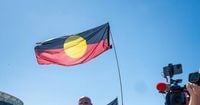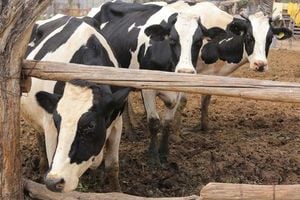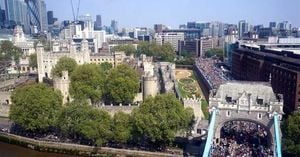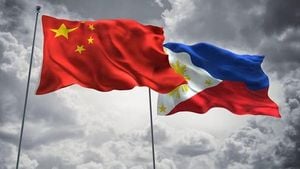In a politically charged atmosphere, Australian Prime Minister Anthony Albanese found himself defending his government’s spending and foreign diplomacy strategies during a heated television interview on April 27, 2025. As the nation gears up for elections, the debate surrounding economic policies, housing affordability, and Indigenous rights has intensified, particularly following a series of controversial events that have sparked public outrage.
During the interview, Albanese faced tough questions about the government’s financial decisions and their implications for Australia’s future. He was specifically pressed on comments made by Treasurer Jim Chalmers in 2017, where he stated that negative gearing and capital gains tax were the "most meaningful lever when it comes to dealing with housing affordability." When asked if this view still held, Albanese acknowledged Chalmers as a “terrific treasurer” but noted that the party’s stance had evolved since then. “We took a policy to the election in 2019, and the Australian people had their say,” he asserted, emphasizing a focus on increasing housing supply instead of changing existing tax structures.
Albanese's government has promised to invest $10 billion towards building 100,000 homes aimed at first-time buyers, yet he dodged questions regarding how many of these homes would be completed by the end of the decade. “We want to get it going. We haven’t passed the legislation yet,” he said, reiterating that the focus remains on supply rather than price control.
In a related issue, the Prime Minister was also confronted about the Labor party’s earlier promise to reduce power bills by $275, a commitment that has come under scrutiny as energy prices continue to rise. When pressed for guarantees that prices would drop by the end of the year, he sidestepped the issue, citing the potential of renewable energy to alleviate costs instead.
Meanwhile, opposition leader Peter Dutton has been vocal about his campaign strategy, telling Sharri Markson that there’s a “long way to go” in the election race. He urged Jewish voters to “keep the faith” and criticized the Albanese government for its handling of anti-Semitism, asserting that the Prime Minister should be held accountable for his actions over the past 18 months.
In a surprising turn, Dutton also criticized the media, referring to them as “activists” with bias against his campaign. This statement came during a press conference where he expressed frustration over the intense scrutiny from journalists covering his campaign.
The political landscape took a darker turn following the disruption of Welcome to Country ceremonies at ANZAC Day dawn services in Melbourne and Perth by a small group associated with neo-Nazi groups. Amnesty International Australia expressed solidarity with Aboriginal and Torres Strait Islander Elders, including Bunurong Elder Uncle Mark Brown and Wurundjeri Elder Aunty Joy Murphy, who was heartbroken after being uninvited from a ceremony for NRL fans due to the backlash from the dawn service incidents.
Rach McPhail, Gomeroi woman and Indigenous Rights Campaign Organiser for Amnesty International Australia, emphasized the importance of these ceremonies, stating, “A Welcome to Country is a cultural protocol that First Nations communities have been conducting for thousands of years.” She condemned the attacks on Elders who perform these ceremonies, calling for greater respect and protection for Indigenous rights.
The controversy surrounding Dutton’s comments on the Welcome to Country ceremonies has added fuel to the fire. Dutton has previously described these ceremonies as “overdone” and suggested they should be reserved for significant events. His remarks came after an Aboriginal elder was heckled while welcoming crowds at an ANZAC Day service, an incident that drew widespread condemnation from leaders across the political spectrum, including Prime Minister Albanese, who labeled the disruption a “disgraceful act of cowardice.”
In the final leaders’ debate, Dutton reiterated his belief that the ceremonies cheapen the significance of Indigenous culture and divide the country. He stated, “Listening to a lot of veterans in the space, Anzac Day is about our veterans... I think the majority view would be that they don't want it on that day.” This sentiment was met with backlash from Indigenous leaders who highlighted the historical contributions of Aboriginal and Torres Strait Islander soldiers in both World Wars.
As the election approaches, the discourse surrounding these issues is expected to intensify. Dutton’s stance on Indigenous rights, particularly following his role in the defeat of the Voice to Parliament referendum, has raised concerns among many voters. He has also expressed intentions to remove Aboriginal and Torres Strait Islander flags from official government press conferences, a move that could further alienate Indigenous communities.
Albanese, on the other hand, has positioned himself as a leader who aims to unite the nation, stating, “What I’ve done is try to bring people together.” He has emphasized the need for compassion and kindness towards vulnerable populations, contrasting his approach with Dutton’s more divisive rhetoric.
As both leaders prepare for the final stretch of the campaign, the Australian public is left to navigate a complex landscape of economic concerns, Indigenous rights, and the future direction of the nation. With the election set for May 3, 2025, voters will have to weigh the implications of each candidate’s policies and statements as they head to the polls.




